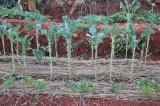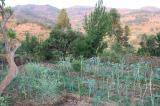The Chikukwa Ecological Land Use Community Trust (CELUCT) in Chikukwa, Chimanimani district, is an inspiring community permaculture project that began in 1991. In October 2011, I was fortunate to tour the area and to interview two of the project’s core members, Patience Sithole and Phineas Chikoshana. Chikukwa is a beautiful, lush and mountainous area that encompasses six villages and is home to about 1000 people. At the time of the project’s inception, however, the place looked very different and the community faced a troubling and deteriorating situation; the whole environment was is a state of degradation with landslides, soil erosion, hunger, droughts and flooding characterizing the area.
These problems were much discussed and bemoaned in the community and in 1991, a group got together and decided to try and do something constructive about it. To begin with, thirty farmers received some initial training in permaculture and natural resource management. The training took place in a forest where participants were encouraged to make their own observations of the surrounding ecosystem and apply their insights to problem-solving at home. In 1992, a refresher course took place with 52 people. In the same year, Chikukwa experienced serious floods. As a result of this confluence of the trainings, concern and the crisis point precipitated by the flood damage, six dedicated souls decided to work together as volunteers, to act as agents of change. They became the catalysts of the incipient community program that was to transform Chikukwa.
From the beginning, they cooperated with the local chief, headmen and sorbhuks and organised regular community meetings. Through various activities, they began to transform their degraded environment, bringing more and more people on board as the months passed. There were/are three project levels, depending on the actions being taken: household projects, such as establishing a fish pond or kitchen garden; group projects (involving 5 families) to develop, for example, an orchard or to create a terrace or hedgerow along a contour; and community projects, such as rehabilitating a hillside or water source. Impressively, the community managed to transform local gullies and springs to restore their water supply and to manage surface water runoff during the rains. They then built a community-wide water storage and distribution system. As a result, nearly all homesteads now have piped, clean tap water fed by a rehabilitated local spring.
Permaculture practices such as agroforestry, inter-cropping, mulching, holistic design and the use of open-pollinated indigenous crop varieties were enrolled to reverse the damage that had been wrought by past over-grazing, mono-cropping and poor environmental conservation practices. Nutrition gardens, home orchards, seed-sharing, hedging and terracing became common practices and as a result, hunger and apathy in the community were greatly reduced.
After the initial experimental stage during 1991-95, with positive results observed by all, CELUCT was ‘officially’ born. In 1995, the community came together to build a community hall and in this new facility, a farmer ‘permaculture school’ (or permachikoro, as they termed it) began. Here, local farmers became teachers, sharing their particular skills and knowledge with others through regular peer-to-peer sharing sessions. In 1996, the Trust and Board were formed. In 1997, a training centre was established with some overseas funding assisting the- by now many- local volunteers. The Centre is now well-equipped with offices, guest accommodation, classrooms, a kitchen and a preschool, as well as a beautiful demonstration garden. Permaculture trainings are facilitated at the Centre for people travelling from far and wide to learn from this model of community-led, holistic development.
Many of the initial and current volunteers are women, as this is/was a community with high levels of male-outmigration; men often leave to seek employment on Chimanimani’s forestry estates or in the cities. Patience Sithole, a founding member and one of the original six volunteers, described how the project had acted as an empowering force for women, who learnt how to make their own decisions, manage and solve their problems together and create their own livelihoods through activities such as bee-keeping, jam-making and selling garden produce. The community-led nature of the project also acted to bring people together in a more democratic and constructive way, which enabled issues such as gender violence and abuse to be discussed more openly. In the act of coming together to take collective responsibility for problems such as deforestation, soil erosion and flooding, the people also began to address other issues such as HIV/AIDS. Working closely with the clinic, CELUCT initiated community councelling and information-sharing sessions.
However, the Chikukwa project has had its own challenges and crises to face. As Phineas Chikoshana put it, “conflicts are everywhere. As an individual, you always have conflicts within yourself (…) and when one is not at peace with him or herself, then that person is bound to have conflicts with others as well. So it’s very important to cultivate a spirit of peace within the community.” Phineas joined the project in 2008 after starting as one of the first trainees on CELUCT’s ‘Building Constructive Community Relations’ (BCCR) program in 2006. This has since, out of a natural necessity, become a central pillar of the Chikukwa project. As time passed and new problems began to arise, (as people worked together in new ways or with new agendas), it was recognized that conflicts (always) arise and so people must know how to effectively deal with them. Through the BCCR program, CELUCT members worked to sensitize each other to conflict resolution methods, in particular the ‘Three Circles of Knowledge’ approach (REF), so that the community could move forward and not allow conflicts to destroy what they had achieved. The original 40 BCCR trainees then ran three-day outreach workshops in the community and CELUCT now hosts conflict resolution trainings for many other organisations and communities. As Phineas shared with me, “the permaculture projects were in a context of community conflict and often led to conflicts over resources and how to manage resources”…but ultimately “development needs peace [in order] to thrive” and so “we must learn how to transform conflict situations”. In other words, as an organization, CELUCT identified that one cannot avoid community conflict and so the project had to integrate these conflict management training into their core practice. This, I feel, is likely the key to their success in maintaining this ongoing community-led project over such a long period.
Permaculture, as an approach and design tool, has no doubt been successfully mobilised in Chikukwa to harness local indigenous knowledge systems as well as active and contemporary ingenuity. The area’s initial problems of deforestation, hunger, drought and flooding have been ameliorated through grassroots collective action and consciously developing new relationships with socio-ecological systems.
Patience identified a few challenges that the community continues to face: difficulties in generating a cash income given the remoteness of Chikukwa’s location from markets (it is 170km to the nearest city, Mutare); fundraising in the context of a global recession; maintaining proper records given inadequate resources to employ professional administrators; and more largely, the threat of genetically modified organisms (GMOs) and the might of the corporates that promote them to maintaining local food sovereignty and safety.
CELUCT are in the process of obtaining organic certification for their agro-processing activities and offer farmer peer-to-peer training in organic production, certification and standardization. Their goal is to continue offering and developing trainings in permaculture and conflict resolution for the youth, to ensure a succession of skills and to foster sustainable livelihoods, water catchments and living systems.
Check out the video page for some visual clips.
For more information, see:
CELUCT (2007) ‘Chikukwa, Then and Now: 15 years of building community and securing life’. Pemba Productions.
- Gutters to harvest and channel rainwater
- Water tank
- Pond created through rainwater harvesting methods
- Mulching the veg patch to increase water retention
- Chikukwa surrounds
- Channels to direct rainwater surface flow
- Compost pit
- Gutter to channel rainwater from roof

















1 Trackback or Pingback for this entry:
[…] View videos from Chikukwa here: https://sustainableagriculturezimbabwe.wordpress.com/2013/08/29/chikukwa-ecological-land-use-communit… […]